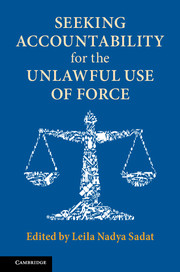Book contents
- Frontmatter
- Dedication
- Contents
- Notes on Contributors
- Foreword
- Preface
- Table of Cases
- Introduction
- PART I HISTORIC AND CONTEMPORARY PERSPECTIVES ON THE UNLAWFUL USE OF FORCE
- PART II MECHANISMS FOR RESTRAINING THE UNLAWFUL USE OF FORCE AND ENHANCING ACCOUNTABILITY
- PART III THE ILLEGAL USE OF FORCE AND THE PROSECUTION OF INTERNATIONAL CRIMES
- 12 The Crime of Aggression under Customary International Law
- 13 The Crime of Aggression and the International Criminal Court
- 14 Prosecuting Aggression Through Other Universal Core Crimes at the International Criminal Court
- 15 The Illegal Use of Force (Other Inhumane Act) as a Crime Against Humanity: An Assessment of the Case for a New Crime at the International Criminal Court
- 16 Aggression, Atrocities, and Accountability: Building a Case in Iraq
- PART IV IMAGINING A BETTER WORLD
- Epilogue
- Index
14 - Prosecuting Aggression Through Other Universal Core Crimes at the International Criminal Court
from PART III - THE ILLEGAL USE OF FORCE AND THE PROSECUTION OF INTERNATIONAL CRIMES
Published online by Cambridge University Press: 21 May 2018
- Frontmatter
- Dedication
- Contents
- Notes on Contributors
- Foreword
- Preface
- Table of Cases
- Introduction
- PART I HISTORIC AND CONTEMPORARY PERSPECTIVES ON THE UNLAWFUL USE OF FORCE
- PART II MECHANISMS FOR RESTRAINING THE UNLAWFUL USE OF FORCE AND ENHANCING ACCOUNTABILITY
- PART III THE ILLEGAL USE OF FORCE AND THE PROSECUTION OF INTERNATIONAL CRIMES
- 12 The Crime of Aggression under Customary International Law
- 13 The Crime of Aggression and the International Criminal Court
- 14 Prosecuting Aggression Through Other Universal Core Crimes at the International Criminal Court
- 15 The Illegal Use of Force (Other Inhumane Act) as a Crime Against Humanity: An Assessment of the Case for a New Crime at the International Criminal Court
- 16 Aggression, Atrocities, and Accountability: Building a Case in Iraq
- PART IV IMAGINING A BETTER WORLD
- Epilogue
- Index
Summary
INTRODUCTION
One act may constitute several different crimes in “ideal concurrence,” because different crime types contain different material elements and protect different legal interests. This feature of domestic criminal law also applies to international criminal law, and for the different crime categories under the Rome Statute of the permanent International Criminal Court (ICC): genocide, crimes against humanity, war crimes, and the crime of aggression. The content of these four crimes are defined in Articles 6–8bis respectively. Hence, the ICC Prosecutor and Court may use multiple legal frameworks to address one particular act, or very closely related acts.
This Chapter discusses to what extent it is feasible, and desirable, to prosecute crimes of aggression through the more familiar legal frameworks of crimes against humanity, war crimes, and genocide. How this might be possible is explained subsequently. In the following, “prosecution” is understood in a broad, non-technical sense. It encompasses the work of the Prosecutor and the Court generally by including all the different stages in prosecutorial decision-making from the start of preliminary examinations of situations, to the opening of investigations and charging of individual suspects, the confirmation of charges by the Pre-Trial Chamber, and further on to trial proceedings before the Court, including sentencing.
Despite the International Military Tribunal (IMT) at Nuremburg proclaiming the initiation of a war of aggression as the “supreme international crime,” no other subsequent international criminal tribunal has been vested with the power to prosecute individuals for aggression. In essence, the definition of a crime of aggression, according to the Rome Statute, Article 8bis, consists of three cumulative elements: an act of aggression as one of several enumerated types of the use of armed force by a State against another State (i.e., attack by armed forces, invasion, occupation, or blockade), which by its character, gravity, and scale constitutes a manifest violation of the Charter of the United Nations, and which has been planned, prepared, initiated, or executed at the leadership level by individuals in a position effectively to exercise control over or to direct the political or military action of the aggressive State. However, aggression will most likely remain difficult to prosecute directly in the foreseeable future, because of the sui generis jurisdictional regime for the formal prosecution of aggression under the Rome Statute of the ICC.
- Type
- Chapter
- Information
- Seeking Accountability for the Unlawful Use of Force , pp. 337 - 385Publisher: Cambridge University PressPrint publication year: 2018



